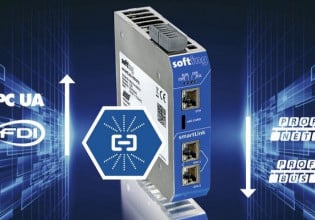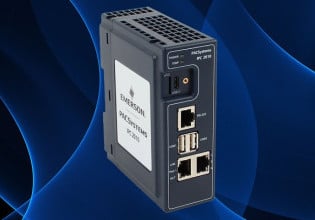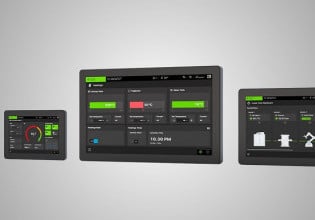J
Note: This editorial first appeared in the English quarterly, IN+OC (Industrial Networking + Open Controls), published by Fieldbus.com. Its copyright is held by Jack Grenard: copyright 1999.
TRENDS: COPING WITH TIDES OF CHANGE
By Jack Grenard
Back in January 1986, less than a year after Michael Francis Hopper and I founded VMEbus Systems magazine, its editor, John Black, and I toured a bus show in Santa Clara, California, USA. John, who'd fathered the VMEbus whilst at
Motorola, said he was amazed at all the uses engineers had found for his bus, things he never imagined designers might do.
That's true for DeviceNet, too, as a modern example. When the Allen-Bradley (now Rockwell Automation) engineers put together the specs for what is today an open networking scheme, they likely didn't imagine that DeviceNet one day would be put to use by some engineers as a full-fledged fieldbus. But that's where it is.
Point: Technology runs as fluid as the people who invent and use it.
What other trends go on today in industrial communications?
The monster looming over many companies' heads is people. Where, the headhunters ask, can we recruit all the new talent we need?
In a speech at National Manufacturing Week in Chicago, Illinois, last March, Thomas J Malott, president of Siemens Energy & Automation, spoke these warning words: "...We, the manufacturers, must, with or without tax credits, use every means available to grow our skilled workforce today. We cannot wait." In other words, pay for training your own people.
Along with that people problem comes another: downsizing and consolidations. We run into many companies every day whose people don't have time to answer their phones or their email messages. Yet they are expected to put on faces of "everything's fine and under control" when communicating. Mostly, they're running away, trying to find time to do their work--and that of three others no longer at the company.
Another trend is the choice of a fieldbus. Plant managers have had to wait too long for the standard one said to be coming since the early 1980s. But suppose you bet your job and grabbed the wrong bus, the one doomed to obsolescence? Luck of the draw?
The role the Internet will play in industrial networking and control still is in doubt. That doesn't stop enterprising companies from embracing the technology. One is Schneider Automation, the Groupe Schneider company
headquartered in North Andover, Massachusetts, USA, that carries on the Modicon brand name. Its people have bet their company's future on the Internet. They work at the green-growing tip of the technology. Now their competitors are taking their work seriously, scrambling to get aboard.
Microsoft's Windows NT still isn't accepted worldwide as a platform for industrial controls. And what about Java?
The tides of change come more often these days. One way to keep up with such trends is to log on to the Automation List, a free effort of Control Technology Corp., headed by Kenneth C. Crater, in Hopkinton, Massachusetts, USA.
Comments come in daily from hundreds of techies all over the world on a variety of control engineering topics. To join the list, send an email message that says SUBSCRIBE to [email protected].
--Jack Grenard
________________
Jack Grenard is a founder of Industrial Controls magazine, now an ISA bimonthly. He has published a monthly newsletter, Industrial Controls Intelligence (formerly The PLC Insider's
Newsletter) since 1981 until its sale in October 1999. Reach him at [email protected].
TRENDS: COPING WITH TIDES OF CHANGE
By Jack Grenard
Back in January 1986, less than a year after Michael Francis Hopper and I founded VMEbus Systems magazine, its editor, John Black, and I toured a bus show in Santa Clara, California, USA. John, who'd fathered the VMEbus whilst at
Motorola, said he was amazed at all the uses engineers had found for his bus, things he never imagined designers might do.
That's true for DeviceNet, too, as a modern example. When the Allen-Bradley (now Rockwell Automation) engineers put together the specs for what is today an open networking scheme, they likely didn't imagine that DeviceNet one day would be put to use by some engineers as a full-fledged fieldbus. But that's where it is.
Point: Technology runs as fluid as the people who invent and use it.
What other trends go on today in industrial communications?
The monster looming over many companies' heads is people. Where, the headhunters ask, can we recruit all the new talent we need?
In a speech at National Manufacturing Week in Chicago, Illinois, last March, Thomas J Malott, president of Siemens Energy & Automation, spoke these warning words: "...We, the manufacturers, must, with or without tax credits, use every means available to grow our skilled workforce today. We cannot wait." In other words, pay for training your own people.
Along with that people problem comes another: downsizing and consolidations. We run into many companies every day whose people don't have time to answer their phones or their email messages. Yet they are expected to put on faces of "everything's fine and under control" when communicating. Mostly, they're running away, trying to find time to do their work--and that of three others no longer at the company.
Another trend is the choice of a fieldbus. Plant managers have had to wait too long for the standard one said to be coming since the early 1980s. But suppose you bet your job and grabbed the wrong bus, the one doomed to obsolescence? Luck of the draw?
The role the Internet will play in industrial networking and control still is in doubt. That doesn't stop enterprising companies from embracing the technology. One is Schneider Automation, the Groupe Schneider company
headquartered in North Andover, Massachusetts, USA, that carries on the Modicon brand name. Its people have bet their company's future on the Internet. They work at the green-growing tip of the technology. Now their competitors are taking their work seriously, scrambling to get aboard.
Microsoft's Windows NT still isn't accepted worldwide as a platform for industrial controls. And what about Java?
The tides of change come more often these days. One way to keep up with such trends is to log on to the Automation List, a free effort of Control Technology Corp., headed by Kenneth C. Crater, in Hopkinton, Massachusetts, USA.
Comments come in daily from hundreds of techies all over the world on a variety of control engineering topics. To join the list, send an email message that says SUBSCRIBE to [email protected].
--Jack Grenard
________________
Jack Grenard is a founder of Industrial Controls magazine, now an ISA bimonthly. He has published a monthly newsletter, Industrial Controls Intelligence (formerly The PLC Insider's
Newsletter) since 1981 until its sale in October 1999. Reach him at [email protected].






